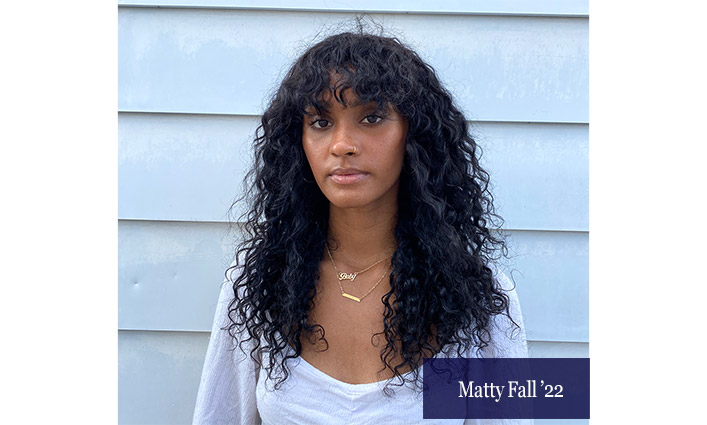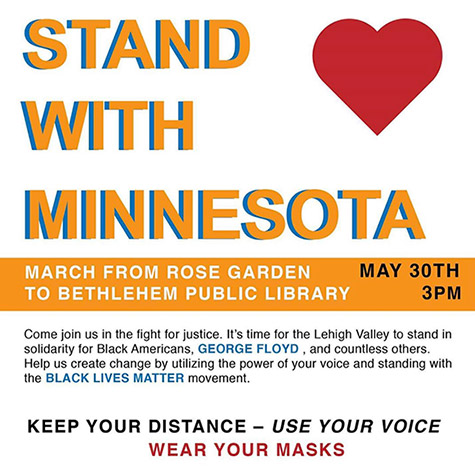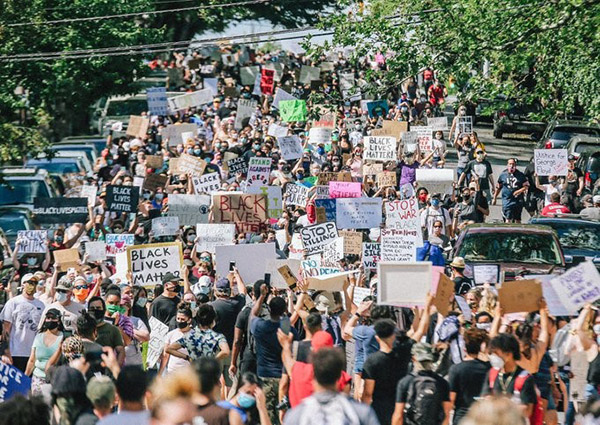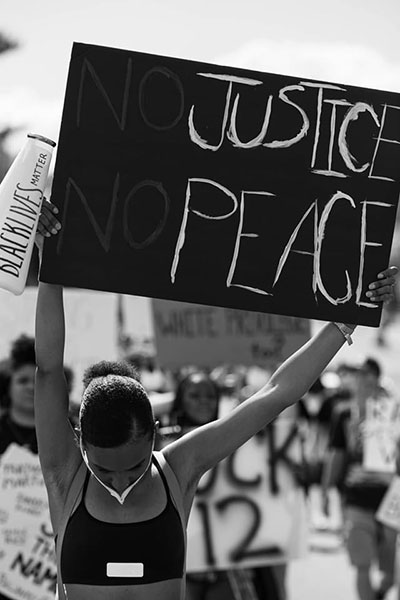
Our country has a painful history of racial injustice. It’s a history we need to reckon with, and a cruel ideology that we can no longer deny still exists today. Our communities of color regularly navigate hostile spaces, face overt acts of racism, and experience racial microaggressions that attack their dignity and humanity. But silence is complicity. That’s why John Jay students, faculty, staff, and alumni are finding ways to protest anti-Black behavior and systemic racism. We’re supporting each other, examining our own feelings and actions, and actively fighting unjust treatment throughout our society.
Matty Fall ’22, a Criminal Justice Management major from Bethlehem, Pennsylvania, may be new to John Jay—she transferred to the College during the Spring 2020 semester—but after seeing how she jumped into action to support the Black Lives Matter (BLM) movement, it’s crystal clear that she was born to be a fierce advocate for justice. By organizing rallies, spearheading social media campaigns, bringing the community together to engage in honest conversations about race, and meeting with local leaders, Fall is bringing the BLM movement to her hometown in hopes of eradicating systemic racism and creating a fairer society for all. “Racism is embedded in so many of our systems—from our education and healthcare systems, to our law enforcement and judicial system,” says Fall, who hopes to one day become a lawyer. “It’s time things change.”
“I don’t need to keep seeing videos of people that look like me being murdered.” —Matty Fall
Deciding to Protest
On the morning of May 29, the Friday after George Floyd’s death, Fall woke up with an overwhelming desire to do something. “I don’t need to keep seeing videos of people that look like me being murdered. I woke up that Friday and said, ‘I want to protest. I want to protest right now.’ I realized nothing will stop these injustices from happening unless enough of us are angry and we say enough is enough. Nothing will change unless we get up and do something,” says Fall, who leaned on friends and family for inspiration and support. Once she decided she wanted to protest, Fall’s friend, Mike, began designing a flyer to promote the event which they planned for the very next day. “We put it on our social media accounts, sent it to everyone we went to high school with, and printed out 100 copies. Mike and I drove around town posting flyers anywhere we could, taping them to mailboxes and telephone poles, and handing it to anyone we came across. That’s how we were able to get the word out so quickly.”

With less than 24 hours to organize, Fall didn’t expect many folks to show up. “I was so nervous, I couldn’t eat all day,” recalls Fall, detailing the anxiety she felt. “Bethlehem is a fairly small, quiet city. You don’t hear much in the way of people voicing their opinions or demonstrating, and it leans toward more conservative, so we didn’t know what the reaction would be. We had no idea how it would all play out. But to my surprise, over 1,000 people, from across Lehigh Valley, came to that first protest.”

“People of all ages and races were peacefully walking side by side in support of Black Lives.” —Matty Fall
Standing in Solidarity
Speaking to the crowd at the start, Fall and several others in attendance gave emotional speeches illustrating their experiences as Black Americans. “I went up to the mic and didn’t have anything prepared. What I said came straight from my heart,” she says. As protestors gathered, Fall found herself moved not only by the number of people that showed up to stand in solidarity with the movement but by the diversity within the crowd. “Bethlehem surprised me so much. People of all ages and races were walking side by side in support of Black lives,” says Fall, who noted that all protestors were asked to wear face masks and keep a safe social distance from one another. “My mom is a nurse working at a hospital that was turned into a Covid-19 unit, so I know the impact of this virus. We wanted to ensure that everyone that was at the protest was safe,” she explains, offering additional details on the day’s event. “It was a peaceful protest. We said the names of Black Americans who had their lives unjustly taken away—George Floyd, Breonna Taylor, Ahmaud Arbery, Eric Garner. The list goes on and on. We had moments of silence and moments of chanting ‘No justice, no peace.’ We walked together for three miles on a very, very hot day, and no one complained, no one was angry, and there was no violence. People looked out for each other. They brought water, snacks, and supplies, some even directed traffic. There were people on the sidewalks that applauded us as we walked by. It really was a special day and one I’ll cherish all of my life.”
“I don’t want people to think this movement is over just because it’s not being covered by the press or isn’t trending on social media. We’re still here. We’re still fighting for justice. We still need change.” —Matty Fall
Transforming Communities
Following that first protest, Fall began to see how one simple act, like deciding to protest, can transform a community. She received a call to meet with the Mayor of Bethlehem, the city’s Chief of Police, and the Bethlehem Area School District (BASD) Superintendent. “We had conversations about race, systemic racism, and the relationship between the Black community and the city’s law enforcement and educational institutions. They wanted to know what we were feeling and what we felt our city can do to create change,” says Fall. “Talking about the issues is a start but there’s still so much more work to be done.”

photo: @danny_digitall on instagram
Moving Forward
Ensuring the movement keeps its momentum, Fall continues to organize protests in Bethlehem. “I don’t want people to think this movement is over just because it’s not being covered by the press or isn’t trending on social media. We’re still here. We’re still fighting for justice. We still need change,” she says. With each new protest, Fall and her fellow organizers have been able to expand their resources and reach. “We’re providing attendees with historical information and current statistics, as well as resources. We’re breaking down why systemic racism is a problem, what white people and non-Black people can do to help, and why allyship is so important,” says Fall. At the next rally, this Saturday, June 27, the focus will be on the LGBTQ+ community. “For the next protest, we’re going to place an emphasis on Black trans people. They are extremely important, do not get protected enough, and are being killed at an alarming rate.”
“For the next protest, we’re going to place an emphasis on Black trans people. They are extremely important, do not get protected enough, and are being killed at an alarming rate.” —Matty Fall
Looking back at the last month, Fall seems shocked by the impact she’s had on her hometown. “The whole thing has been really emotional,” she admits. But she’s also incredibly proud. “I remember looking at my friends at the end of that first protest and thinking, We did it. We lit a spark in this town. A few days later, I was driving and saw an older white gentleman walking by himself up and down the road, holding up a ‘Justice for Breonna Taylor’ sign. Something like that would have never happened in this town before the protest,” says Fall. “It just goes to show you that when you believe in something and you decide to take initiative, people are willing to listen, they’re willing to learn, they’re willing to stand up beside you and help. Good is coming from these protests. I really believe we can help make change happen.”



